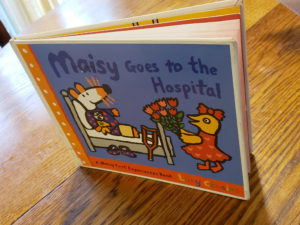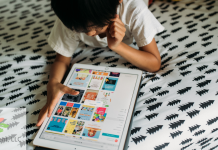Part 2 | Our comical, stressful treatment journey – You can read part 1 here.
My daughter started wearing glasses at 11 months, just before she learned to walk. Well, we bought her glasses to wear… but it’s easier said than done to keep them on a baby!
She immediately took them off and took them apart. She learned how to pop out the lenses and chew on them like chips, much to the horror of her daycare teachers! She’d wear them as a hat or sling them down like a beard. Keeping them out of her friends’ curious hands was equally difficult – she attended school with a toy on her face!
At 28 months, the pediatric ophthalmologist scheduled her for strabismus surgery. The glasses were a temporary aid and her eyes needed further intervention to improve.

This Maisy book played a big role in our preparation for surgery. We found it at our local library and Maisy quickly became one of her favorite characters. It helped us explain what she would experience in two-year-old facts.
The surgery itself was quick and routine. My daughter was a champ the whole day! She had to wear arm braces to prevent her from rubbing her eyes. These had to stay on for several hours and also overnight for a few nights. Recovery was easy – even if the arm braces preventing her from fully snuggling her stuffed animals.
Post-op
My daughter resumed normal activities quickly, with no complications and no glasses post-surgery. At her one month follow up, she still showed signs of strabismus and had not yet acquired depth perception. We were disappointed but understood that this would take time.
A year and a half later, her vision still hadn’t improved much. The doctor explained that even if her eyes were straight, that doesn’t mean she will ever use them together (and have depth perception.) Returning to glasses could help her use her eyes together and help strengthen the muscles for the long-term. Not the kind of news we expected after going through what was thought to be a successful surgery.
Glasses again at age four
What a completely different experience! My daughter eagerly asked for weeks when she would get to wear them again. She was PUMPED when they arrived and told everyone who would listen all about it! She was all about responsibility and following rules, so I took some time to show her the do’s and don’ts of glasses. She took to these guidelines literally. At suppertime, she had a meltdown after we told her to keep her glasses on while she ate. Through the whimpers, she croaked, “But… they’ll… get… dirty!!” I explained that I keep mine on, so watch me and she’d be fine. She was SUPER proud of herself when she successfully drank her orange juice and her glasses remained unscathed!
Seeing in 3D
At long last, my 5 ½-year-old daughter started acquiring depth perception. This is a huge cause for celebration! Having even a little is so, so helpful; We can work with that! Her new ophthalmologist here at the UW Health Lions Pediatric Eye and Adult Strabismus Clinic gave her glasses with bifocals (yes, they’re not just for adults!)
We met the gains halfway by encouraging her to get active.
- Swimming caused her to feel disoriented in the past and she wouldn’t jump into the pool until age 4 or 5. Now she’s swimming with the best of her peers.
- We took her training wheels off at 7 years old and started “striding” for a while. She wasn’t super confident until age 8, and at 9 years old, proudly participated in the school’s bike rodeo!
- My daughter has always loved dance class and she ventured into gymnastics for a year, too. Her improved balance, coordination, and confidence are beautiful to see.
The plan is to slowly wean her off of the bifocals. I understand that an additional surgery wouldn’t actually help right now, even though her eye struggles as soon as her glasses are off.
We’re getting to the point that she might start taking the lead on things. She can tell us what’s most comfortable and what she experiences at school – does she get double vision? Get dizzy? Get teased? If it continues to be a problem, I want her to have input on any big decisions. It’s not up to me anymore – that would make it cosmetic. She’s my bright, beautiful girl, working hard to enjoy life in multiple dimensions.
Strabismus is far from a cosmetic situation. Be sure to bring up any eye-related concerns with your child’s pediatrician. The American Academy of Ophthalmology recommends that all newborns, infants, and preschoolers be screened to catch vision disorders as early as possible.

















Great write up Rachel. This condition has caused me many difficulties. I never realized until I was older that “no the ball does NOT have a magnet that causes it to hit me in the glasses” instead of catching it as I have no clue as to distance. Driving is the worse and its a struggle that was embarrassing until I came terms with the issue. As I pushed Rachel with my granddaughter’s issue,PLEASE watch your children for this issue and push your doctor as well.
Rachel’s Mom